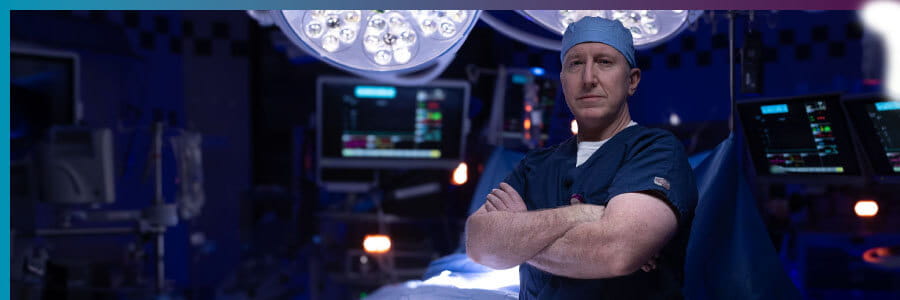A western Pennsylvania native, David Kaczorowski, MD, remembers reading about UPMC's achievements in organ transplantation in the newspaper growing up.
Those experiences sparked an interest in medicine. Later, when he decided to pursue a career in health care, he became interested in cardiac surgery after seeing procedures performed.
"The sheer elegance and fluidity of the operations appealed to me," says Dr. Kaczorowski, surgical director, Advanced Heart Failure Center, UPMC Heart and Vascular Institute. "That really furthered my interest. I kind of married those two interests by choosing a career in cardiac transplantation."
As a cardiac surgeon, Dr. Kaczorowski cares for patients with advanced heart failure who haven't seen improvement with other treatment methods. Surgical treatment options for those patients can include assistive devices or, in the most severe cases, heart transplants.
Dr. Kaczorowski works closely with patients' cardiologists to determine when surgery is necessary and what procedure will help most.
“A typical day for me involves taking care of patients with heart failure, cardiogenic shock, and coronary and cardiac disease," he says. "I identify patients who need surgery, discuss which procedure is most appropriate for them, and see them through it safely."
The UPMC Heart and Vascular Institute is a national leader in cardiac surgery, including cardiac transplantation. It is one of the highest volume heart transplant centers in the state with outcomes that exceed other centers in the region.
The center also is a leader in innovation. UPMC surgeons use minimally invasive techniques for the implantation of assistive devices. Dr. Kaczorowski is a pioneer in the research and development of these minimally invasive insertion techniques.
The UPMC Heart and Vascular Institute is also on the cutting-edge of heart transplantation, including locating donors and performing multi-organ transplants. They also utilize UPMC's expertise in immunology and immunosuppression techniques, lowering the risk of organ rejection.
"I'm so proud to be part of the team at UPMC and to offer the kind of care that we do for our patients," Dr. Kaczorowski says.
Many patients come to the UPMC Heart and Vascular Institute for a second opinion after being turned down by other centers. UPMC often takes on these challenging cases.
“For patients that have been turned down at other centers, we want to offer them a chance to get a heart transplant," Dr. Kaczorowski says. "If we can do that, it can give them an opportunity to have a new lease on life. That's really our goal."
The decision to pursue heart transplant surgery can be a difficult one. Like any other operation, it carries risk. This is why surgeons work so closely with a patient's cardiologist to determine when surgery is necessary. They also make sure to have detailed discussions with patients and their families about the procedure.
But a successful heart transplant is a life-changing — and lifesaving — surgery for people in need.
"I don't know if there are words for it," Dr. Kaczorowski says. "It's absolutely remarkable to see someone go through a heart transplant, recover, and do well. It's nothing short of miraculous."
At UPMC, Life Changing Medicine means being a leader in lifesaving transplants.
Find Care Near You























